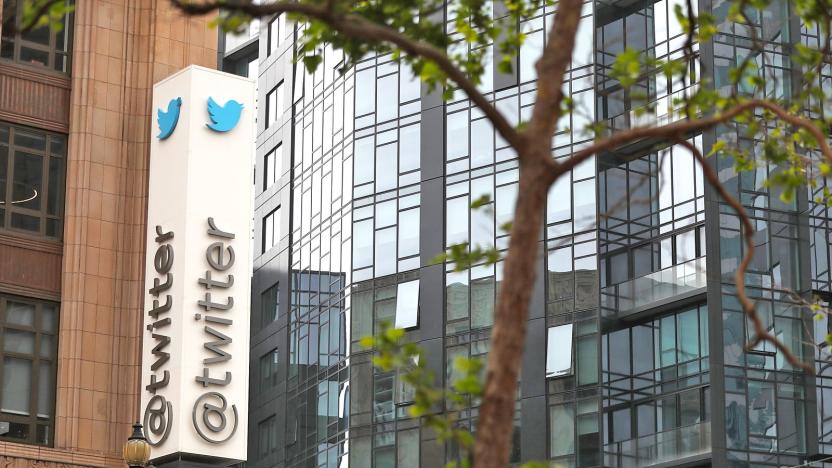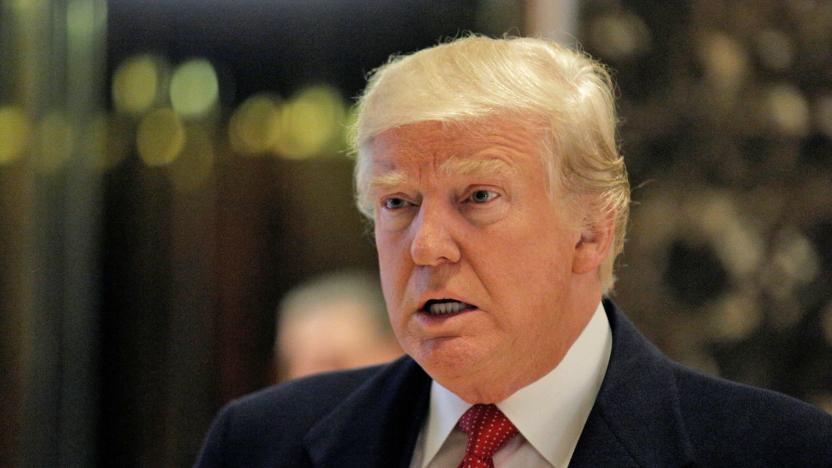USGovernment
Latest

Huawei will reportedly sue the US government this week
Huawei will reportedly sue the US government this week for banning its telecom products from federal agencies, according to the NY Times. The company is trying to defend itself from US charges that it's a security threat, and the lawsuit could be a move to force the US government to reveal more about what it knows. Recently, Huawei and its CEO Ren Zhengfei have gone on the offensive, citing Edward Snowden and saying, "there's no way the US can crush us.

Income, tax and immigration data stolen in Healthcare.gov breach
The Centers for Medicare and Medicaid Services (CMS) now has details about the data stolen in the breach of Healthcare.gov that occurred last month. According to the government agency, a significant amount of personal information including partial Social Security numbers, tax information and immigration status was compromised in the breach. No financial information was stolen.

Trump administration suggests firmer controls on data privacy
The National Telecommunications and Information Administration (NTIA) has laid out the Trump administration's approach to bolstering data privacy. The agency is seeking to strike a balance between increased consumer protection and affording companies room to innovate with its proposals, which could lead to a US version of the EU General Data Protection Regulation (better known as GDPR).

FBI reportedly advising companies to ditch Kaspersky apps
Kaspersky Lab's tussle with the US government could have ramifications for its dealings with the private sector. A new report claims the FBI has been meeting with companies to warn them of the threat posed by the cybersecurity firm. The briefings are the latest chapter in an ongoing saga concerning the use of Kaspersky's products by government agencies. Officials claim the company is a Russian stooge that can't be trusted with protecting America's critical infrastructure. The company denies these claims -- its CEO Eugene Kaspersky has even offered up its source code in a bid to clear his firm's name.

Judge sides with Twitter in lawsuit against the US government
The lawsuit Twitter filed against the US government over the right to fully disclose national security requests hasn't been resolved yet, but at least it isn't dead. US District Judge Yvonne Gonzalez Rogers has allowed the case to go forward after the court deliberated the Department of Justice's motion for summary judgment. The social network filed the lawsuit in late 2014, arguing that it should be allowed to post the exact number of national security letters and FISA court orders it gets in its transparency reports. As it stands, tech companies can only state the number of letters and orders they receive in big number ranges. That's why you'll see figures like 0 to 499, 500 to 999 and so on and so forth in their transparency reports.

Telegram founder says US government tried to bribe developers
Dismissed as a WhatsApp clone when it launched in August 2013, Telegram has grown like a weed. The messaging service now counts more than 100 million monthly active users, who have flocked to the platform to play games, make video calls, interact with bots and, perhaps most importantly, benefit from its end-to-end encryption. Telegram's size and its desire to keep private messages truly private (although that has been debated) likely made it the target of US government, which reportedly tried to bribe its developers and influence its founder Pavel Durov last year.

Trump could convert government news agencies to propaganda machines
One more thing President-elect Trump will inherit when he takes office next month: a large, state-run media operation with little or no impartial oversight. As the Washington Post's editorial board wrote this weekend, the United States' official external news sources Voice of America, Radio Free Europe, Radio Liberty and others are about to lose the buffer that keeps the content they project to the world fair and objective.

Yahoo reportedly gave US government access to all users' emails (updated)
According to Reuters, Yahoo provided US intelligence officials access to all of its customers incoming emails last year. The publication's sources claim that the company had to comply with a classified request from the government, which allowed the National Security Agency and FBI to scan "hundreds of millions" of Yahoo Mail accounts.

US government outlines its policy on self-driving cars
It's not out of the realm of possibility for fully self-driving cars to hit public roads in the next few years, what with Google, Tesla, Uber and other big-name companies working on the technology. Now, the US government has officially thrown its weight behind the technology and released a Federal Automated Vehicles policy. In it, the Department of Transportation outlines a set of 15 safety assessment objectives manufacturers have to meet to ensure their vehicles can meet regulators' requirements. It also clarifies the division of state and federal responsibilities, as well as the regulatory tools the DOT plans to use. According to the department, the policy is "rooted in [its] view that automated vehicles hold enormous potential benefits for safety, mobility and sustainability."

The government spends billions maintaining archaic IT systems
It's one thing when an automaker or maybe a school uses incredibly old equipment to keep its internal systems afloat, but when it's the federal government that's another matter entirely. Case in point: The United States Government Accountability Office recently released a report stating that President Obama's IT budget request for the 2017 fiscal year was $89 billion. And a bulk of it is for keeping legacy tech running.

US transportation department confirms drone registration program
You might call your remote-controlled, quad-copter flying toy a "drone," but to the US government it's an "unmanned aircraft system", and it needs some red tape. Yes, the rumors were true: the Department of Transportation is creating a mandatory registration process for drones and unmanned aircraft. Today, it officially announced the program and the task force that will recommend policies and safety standards.

US will reportedly require consumers to register their drones
If you get a new drone this holiday season, you might have to register it with the US government. According to a report from NBC News, the US is ready to announce new requirements for consumers purchasing drones, the most notable of which is that you'll need to register it with the department of transportation. It's part of a plan to make sure that drones don't end up colliding with aircraft flying in and out of airports, something that has the government rightly concerned.

President Obama calls for stronger American cybersecurity
Citing a series of embarrassing, high profile incursions against US computer networks in recent months, President Obama called for "much more aggressive" efforts to shore up the government's vulnerable cyber-infrastructure. "This problem is not going to go away," the President told reporters at a G7 press conference in Germany. "It is going to accelerate. And that means that we have to be as nimble, as aggressive and as well-resourced as those who are trying to break into these systems." As such, he urged Congress to pass its pending cybersecurity legislation, such as the Cybersecurity Information Sharing Act of 2015.

White House secretly expands NSA power to collect US internet data
The Obama administration expanded the NSA's ability to collect Americans' internet data in 2012, with absolutely no notice to the public, The New York Times reports. The Justice Department issued two memos, in secret, to the NSA allowing the agency to gather and search Americans' international internet traffic without a warrant, ostensibly to find foreign hackers or malware. The secret memos allowed the NSA to track IP addresses and cybersignatures that could be tied to foreign governments. However, documents provided to the Times by Edward Snowden show that the NSA tried to target hackers that weren't tied to any foreign authority.

Most of the government's anonymous tiplines aren't secure
When it comes to whistleblowing, privacy is paramount -- just ask Edward Snowden. It's also why news from an American Civil Liberties Association report (PDF) about anonymous government tiplines not using HTTPS encryption is all the more alarming. In a letter to Tony Scott -- not the late filmmaker, the United States chief information officer -- the ACLU's Michael W. Macleod-Ball and Christopher Soghoian implore the government to fast-track efforts to swap the some 29 websites that are required by law to protect the anonymity of tipsters over to HTTPS. If that can't happen immediately (Scott has a two-year plan to encrypt all government websites) then the ACLU suggests allowing people to use the Tor browser for alerting the authorities about fraud or waste in the interim. Currently, the anonymity-minded browser is blocked by certain federal agency websites.

Senators kill bill aimed at ending NSA's mass phone surveillance
Back in May, the US government began to process a bill aimed at reining in the NSA's powers of surveillance -- if Google, Apple and Microsoft are sending group letters, you know it's an important bill. However, it's been left on Capitol Hill, rejected by the Senate. It failed a procedural vote, after senior Republicans said it would affect efforts to defend the country from enemies. It fell short of the 60 votes needed, gathering 58 to 42 votes. It's now unlikely to become law, as Republicans (who made up most of the opposition), will hold a majority in the Senate in the new year.

US government says someone besides Snowden is leaking secret docs
Due to content of a report from The Intercept, the US government says that there's a new whistle blower leaking its secrets in addition to Edward Snowden. The article details national security documents prepared by the National Counterterrorism Center dated August 2013 -- after the former NSA contractor left the US for Russia. Focusing on databases used to organize suspected terrorists' identities, the report details one specific repository -- the Terrorist Identities Datamart Enivornment (TIDE) -- that now tallies a million names. According to The Intercept, 680,000 suspects make up the Terrorist Screening Database (TSDB) portion of TIDE, with over 40 percent (280,000 to be exact) labeled by the government as having no affiliation with a terrorist group. Documents also shed light on how the screening system has expanded under the Obama Administration to include the collection of biometric data (facial images, fingerprints, and iris scans) of watchlisted Americans. What's more, part of the process included pulling records for every person with a driver's license in Illinois, Indiana and Wisconsin in the time leading up to the Chicago Marathon. [(Photo credit: Andrew Harrer/Bloomberg via Getty Images]

House passes amendment to cut NSA's 'backdoor search' funding
Following a push from several Representatives, the House has pushed through an amendment -- tagged on to the Fiscal Year 2015 Department of Defense Appropriations Act (H.R. 4870) -- to stop at least some of the surveillance programs at the National Security Agency. Mark Rumold, a lawyer for the Electronic Frontier Foundation, said "the House of Representatives took an important first step in reining in the NSA." On Monday, Representative Justin Amash said the bill was a chance to stop the security agency's "unconstitutional spying on Americans." The backdoor searches that the amendment would stop includes emails, browsing and chat history, which can currently be parsed and searched without a warrant. The amendment would curb this in two ways: it would cut off funding for the search of government databases for information on US citizens while also prohibiting both the NSA and CIA from requiring "backdoors" in online services and products. It's not a done deal just yet: now that it's passed the House, it needs to go through the Senate before it can become a reality.

US government lifts restrictions on high-detail satellite imaging
The US government will now allow the likes of Google and Microsoft's Bing to use satellite images containing far more detail. Previous restrictions stopped anything smaller than 50 cm (1.64 feet) being shown on satellite photos. Imaging company Digital Globe was behind the request, and reckons it could well take shots from space that capture things as small as 31 cm. Lawyer Marc Daultich told the BBC that this could raise security concerns, although this restriction didn't really encompass the blurring or otherwise obscuring of sensitive locations. Digital Globe plans to launch new satellites following the decision and says it'll be able to take thrilling photos of "key features such as manholes and mailboxes". And hopefully something a little more interesting, too.

Coursera teams up with State Department on series of MOOC-based 'learning hubs' around the world
Coursera is already one of the leading providers of MOOCs (or massive open online courses) in the US, and its now getting a helping hand from none other than the US government in broadening its worldwide ambitions. The company announced a new initiative today that will see it partner with the State Department and a number of other organizations on a series of "learning hubs" around the world, where students will be able to go and access the internet and participate in MOOCs as a group. Those classes won't be quite as "massive" as your usual MOOC, however. According the The New York Times, the classes will all be small ones -- some with as few as 15 students -- and they'll be supplemented by weekly in-person sessions with a local instructor for what Coursera's Lila Ibrahim describes as a "blended learning experience." For its part, the State Department says that it hopes the courses will not only help students where they are, but "help connect them to U.S. higher education institutions" as well.














